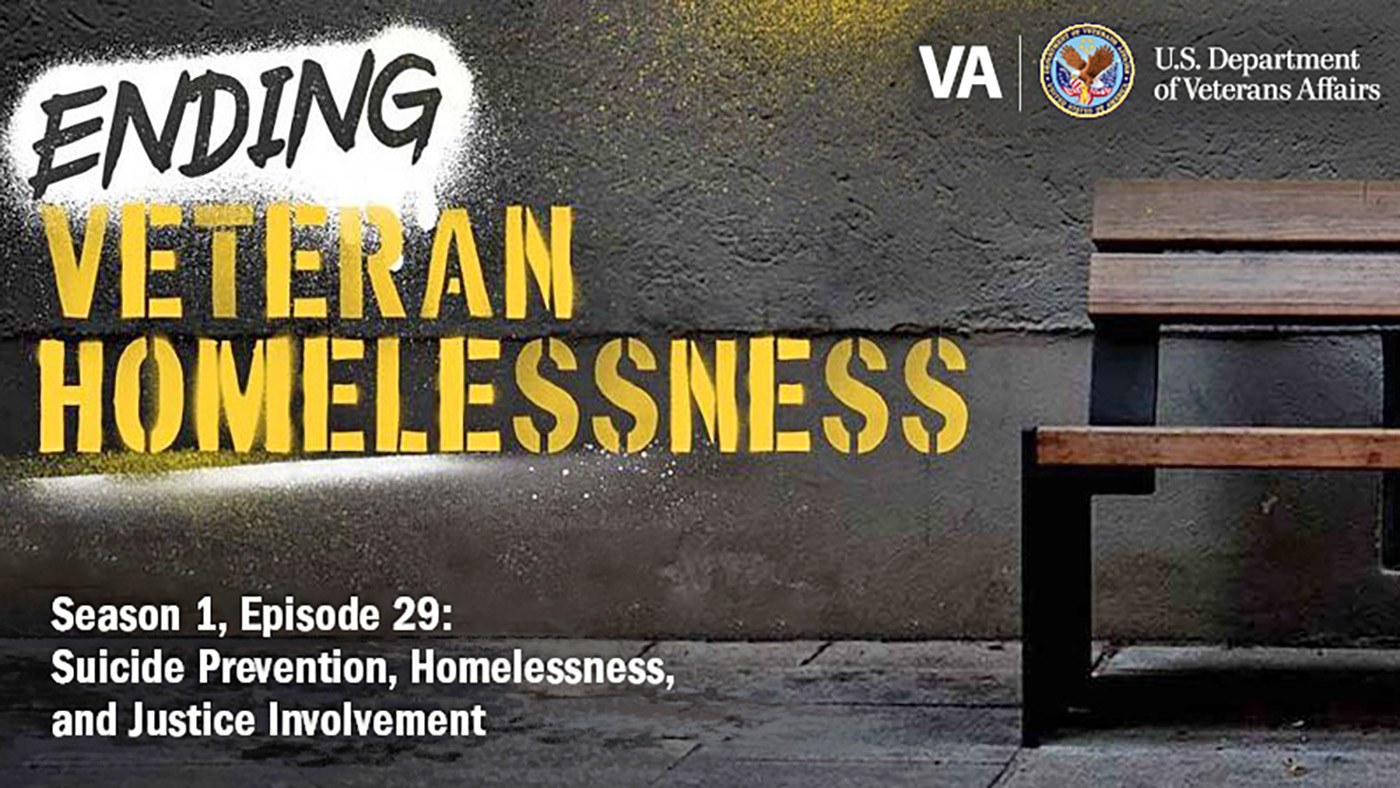Note: This article discusses themes of suicide and self-harm which may be distressing for some readers. If you or another Veteran you know is struggling, reach out for help through the National Call Center for Homeless Veterans at 1-877-4AID VET (877-424-3838).
When you’re at your lowest, a helping hand can be the hope you need. VA provides just that for Veterans facing the twin threats of homelessness and criminal legal issues, and in doing so helps lower their risk of suicide.
In September, during Suicide Prevention Month, we addressed the urgent issue of Veteran suicide on our “Ending Veteran Homelessness” podcast. This year, we put the focus on justice-involved homeless Veterans, who are among those with the highest risk of suicide.
Listen to “S1EP29: Suicide Prevention, Homelessness, and Justice Involvement” on Spreaker.
Evaluating risk factors
According to the 2023 National Veterans Suicide Prevention Annual Report, the suicide rate for Veterans who used VA health care and had experienced homelessness in 2021 was 112.9 per 100,000. It’s one of the highest rates out of all subpopulations of Veterans analyzed and represents an increase of 38.2% from 2020 to 2021.
But the group with the highest rate of suicide was Veterans enrolled in VA health care who accessed Veterans Justice Program services. Their rate of suicide was 151 per 100,000 and was the highest of all subpopulations analyzed in the report. This represented an increase 10.2% from 2020 to 2021.
Another recent study found that Veterans who are both homeless and involved in the criminal legal system have suicide attempt rates that are substantially higher than those without either of those risk factors or even just one of them.
This finding was discussed on the podcast by Dr. Ryan Holliday, clinical research psychologist at the Rocky Mountain Mental Illness Research, Education, and Clinical Center for Suicide Prevention and assistant professor at the University of Colorado Anschutz Medical Campus. “It really speaks to how important it is for us to think about all of these complex factors at the same time,” he said.
Homelessness and justice involvement weave together a tangled web of cause and effect with justice involvement increasing one’s risk of homelessness and suicide, and homelessness increasing one’s risk for future justice involvement and suicide.
Bringing hope to homeless Veterans
Fellow guest Katie Stewart, national program coordinator for the Veterans Justice Outreach program, oversees the teams who try to reach these Veterans. Each year, specialists visit Veterans in more than 2,000 jails around the country.
When serving in an outreach role, Stewart would often visit with Veterans who were in jail “experiencing the worst day of their life.” They could be suffering from withdrawal, worried about losing their jobs, concerned they had permanently alienated friends and family or wondering if they were going to prison. Often, she would be the only person visiting them. “The most powerful thing I could do was to sit down in front of them, be kind and be an extender of VA,” she shared.
Through Homeless Patient Aligned Care Teams, VA is able to provide streamlined health care, social services and tailored, evidence-based solutions for each Veteran.
VA is working to hire peer specialists—Veterans who have lived experience and can bring hope of a brighter future to Veterans who are struggling. And VA is developing closer ties with law enforcement and first responders to be able to step in earlier to help Veterans.
“If we can help people get connected to services when life first starts to get hard, we know that we have a much better chance of keeping them out of crisis, keeping them out of the justice system and keeping them from a situation where they’re at risk for overdose or homelessness,” said Stewart.
Learn about VA programs
- If you are a Veteran who is homeless or at risk for homelessness or need to connect with a Veterans justice outreach specialist, call the National Call Center for Homeless Veterans at 877-4AID-VET (877-424-3838).
- Visit the VA Homeless Programs website to learn about housing initiatives and other programs for Veterans exiting homelessness.
- Check out the Ending Veteran Homelessness podcast to learn more about what VA is doing about Veteran homelessness.
- Learn how to get involved with housing homeless Veterans.
- Subscribe to the Homeless Programs Office newsletter to receive monthly updates about programs and supportive services for Veterans experiencing or at risk of homelessness.
Topics in this story
Link Disclaimer
This page includes links to other websites outside our control and jurisdiction. VA is not responsible for the privacy practices or the content of non-VA Web sites. We encourage you to review the privacy policy or terms and conditions of those sites to fully understand what information is collected and how it is used.
More Stories
Watch the Under Secretary for Health and a panel of experts discuss VA Health Connect tele-emergency care.
The 2024 National Veteran Suicide Prevention Annual Report provides the foundation for VA’s suicide prevention programs and initiatives.
Theranostics is a specialized field of nuclear medicine that uses a two-pronged approach to diagnose and treat cancer.







This program makes a lot of sense, but what about those who got into trouble prior to discharge? With bad paper, they would have difficulty in finding work, which could lead to homelessness and suicide. The VA should take care of them, too.